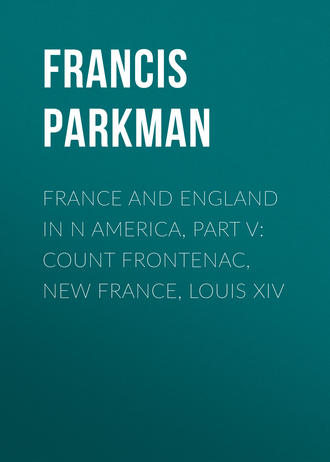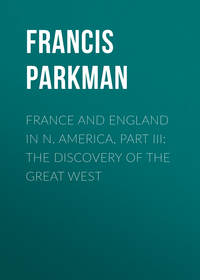 полная версия
полная версияFrance and England in N America, Part V: Count Frontenac, New France, Louis XIV
Thirdly, "the warriors of the Five Nations have made sundry barbarous inroads into the country of the Illinois and Miamis, seizing, binding, and leading into captivity an infinite number of these savages in time of peace. They are the children of my king, and are not to remain your slaves. They must at once be set free and sent home. If you refuse to do this, I am expressly ordered to declare war against you."
La Barre concluded by assuring Big Mouth, as representing the Five Nations of the Iroquois, that the French would leave them in peace if they made atonement for the past, and promised good conduct for the future; but that, if they did not heed his words, their villages should be burned, and they themselves destroyed. He added, though he knew the contrary, that the governor of New York would join him in war against them.
During the delivery of this martial harangue, Big Mouth sat silent and attentive, his eyes fixed on the bowl of his pipe. When the interpreter had ceased, he rose, walked gravely two or three times around the lines of the assembly, then stopped before the governor, looked steadily at him, stretched his tawny arm, opened his capacious jaws, and uttered himself as follows:—
"Onontio, I honor you, and all the warriors who are with me honor you. Your interpreter has ended his speech, and now I begin mine. Listen to my words.
"Onontio, when you left Quebec, you must have thought that the heat of the sun had burned the forests that make our country inaccessible to the French, or that the lake had overflowed them so that we could not escape from our villages. You must have thought so, Onontio; and curiosity to see such a fire or such a flood must have brought you to this place. Now your eyes are opened; for I and my warriors have come to tell you that the Senecas, Cayugas, Onondagas, Oneidas, and Mohawks are all alive. I thank you in their name for bringing back the calumet of peace which they gave to your predecessors; and I give you joy that you have not dug up the hatchet which has been so often red with the blood of your countrymen.
"Listen, Onontio. I am not asleep. My eyes are open; and by the sun that gives me light I see a great captain at the head of a band of soldiers, who talks like a man in a dream. He says that he has come to smoke the pipe of peace with the Onondagas; but I see that he came to knock them in the head, if so many of his Frenchmen were not too weak to fight. I see Onontio raving in a camp of sick men, whose lives the Great Spirit has saved by smiting them with disease. Our women had snatched war-clubs, and our children and old men seized bows and arrows to attack your camp, if our warriors had not restrained them, when your messenger, Akouessan, appeared in our village."
He next justified the pillage of French traders on the ground, very doubtful in this case, that they were carrying arms to the Illinois, enemies of the confederacy; and he flatly refused to make reparation, telling La Barre that even the old men of his tribe had no fear of the French. He also avowed boldly that the Iroquois had conducted English traders to the lakes. "We are born free," he exclaimed, "we depend neither on Onontio nor on Corlaer. We have the right to go whithersoever we please, to take with us whomever we please, and buy and sell of whomever we please. If your allies are your slaves or your children, treat them like slaves or children, and forbid them to deal with anybody but your Frenchmen.
"We have knocked the Illinois in the head, because they cut down the tree of peace and hunted the beaver on our lands. We have done less than the English and the French, who have seized upon the lands of many tribes, driven them away, and built towns, villages, and forts in their country.
"Listen, Onontio. My voice is the voice of the Five Tribes of the Iroquois. When they buried the hatchet at Cataraqui (Fort Frontenac) in presence of your predecessor, they planted the tree of peace in the middle of the fort, that it might be a post of traders and not of soldiers. Take care that all the soldiers you have brought with you, shut up in so small a fort, do not choke this tree of peace. I assure you in the name of the Five Tribes that our warriors will dance the dance of the calumet under its branches; and that they will sit quiet on their mats and never dig up the hatchet, till their brothers, Onontio and Corlaer, separately or together, make ready to attack the country that the Great Spirit has given to our ancestors."
The session presently closed; and La Barre withdrew to his tent, where, according to La Hontan, he vented his feelings in invective, till reminded that good manners were not to be expected from an Iroquois. Big Mouth, on his part, entertained some of the French at a feast which he opened in person by a dance. There was another session in the afternoon, and the terms of peace were settled in the evening. The tree of peace was planted anew; La Barre promised not to attack the Senecas; and Big Mouth, in spite of his former declaration, consented that they should make amends for the pillage of the traders. On the other hand, he declared that the Iroquois would fight the Illinois to the death; and La Barre dared not utter a word in behalf of his allies. The Onondaga next demanded that the council fire should be removed from Fort Frontenac to La Famine, in the Iroquois country. This point was yielded without resistance; and La Barre promised to decamp and set out for home on the following morning. 111
Such was the futile and miserable end of the grand expedition. Even the promise to pay for the plundered goods was contemptuously broken. 112 The honor rested with the Iroquois. They had spurned the French, repelled the claims of the English, and by act and word asserted their independence of both.
La Barre embarked and hastened home in advance of his men. His camp was again full of the sick. Their comrades placed them, shivering with ague fits, on board the flat-boats and canoes; and the whole force, scattered and disordered, floated down the current to Montreal. Nothing had been gained but a thin and flimsy truce, with new troubles and dangers plainly visible behind it. The better to understand their nature, let us look for a moment at an episode of the campaign.
When La Barre sent messengers with gifts and wampum belts to summon the Indians of the Upper Lakes to join in the war, his appeal found a cold response. La Durantaye and Du Lhut, French commanders in that region, vainly urged the surrounding tribes to lift the hatchet. None but the Hurons would consent, when, fortunately, Nicolas Perrot arrived at Michillimackinac on an errand of trade. This famous coureur de bois—a very different person from Perrot, governor of Montreal—was well skilled in dealing with Indians. Through his influence, their scruples were overcome; and some five hundred warriors, Hurons, Ottawas, Ojibwas, Pottawatamies, and Foxes, were persuaded to embark for the rendezvous at Niagara, along with a hundred or more Frenchmen. The fleet of canoes, numerous as a flock of blackbirds in autumn, began the long and weary voyage. The two commanders had a heavy task. Discipline was impossible. The French were scarcely less wild than the savages. Many of them were painted and feathered like their red companions, whose ways they imitated with perfect success. The Indians, on their part, were but half-hearted for the work in hand, for they had already discovered that the English would pay twice as much for a beaver skin as the French; and they asked nothing better than the appearance of English traders on the lakes, and a safe peace with the Iroquois, which should open to them the market of New York. But they were like children with the passions of men, inconsequent, fickle, and wayward. They stopped to hunt on the shore of Michigan, where a Frenchman accidentally shot himself with his own gun. Here was an evil omen. But for the efforts of Perrot, half the party would have given up the enterprise, and paddled home. In the Strait of Detroit there was another hunt, and another accident. In firing at a deer, an Indian wounded his own brother. On this the tribesmen of the wounded man proposed to kill the French, as being the occasion of the mischance. Once more the skill of Perrot prevailed; but when they reached the Long Point of Lake Erie, the Foxes, about a hundred in number, were on the point of deserting in a body. As persuasion failed, Perrot tried the effect of taunts. "You are cowards," he said to the naked crew, as they crowded about him with their wild eyes and long lank hair. "You do not know what war is: you never killed a man and you never ate one, except those that were given you tied hand and foot." They broke out against him in a storm of abuse. "You shall see whether we are men. We are going to fight the Iroquois; and, unless you do your part, we will knock you in the head." "You will never have to give yourselves the trouble," retorted Perrot, "for at the first war-whoop you will all run off." He gained his point. Their pride was roused, and for the moment they were full of fight. 113
Immediately after, there was trouble with the Ottawas, who became turbulent and threatening, and refused to proceed. With much ado, they were persuaded to go as far as Niagara, being lured by the rash assurance of La Durantaye that three vessels were there, loaded with a present of guns for them. They carried their canoes by the cataract, launched them again, paddled to the mouth of the river, and looked for the vessels in vain. At length a solitary sail appeared on the lake. She brought no guns, but instead a letter from La Barre, telling them that peace was made, and that they might all go home. Some of them had paddled already a thousand miles, in the hope of seeing the Senecas humbled. They turned back in disgust, filled with wrath and scorn against the governor and all the French. Canada had incurred the contempt, not only of enemies, but of allies. There was danger that these tribes would repudiate the French alliance, welcome the English traders, make peace at any price with the Iroquois, and carry their beaver skins to Albany instead of Montreal.
The treaty made at La Famine was greeted with contumely through all the colony. The governor found, however, a comforter in the Jesuit Lamberville, who stood fast in the position which he had held from the beginning. He wrote to La Barre: "You deserve the title of saviour of the country for making peace at so critical a time. In the condition in which your army was, you could not have advanced into the Seneca country without utter defeat. The Senecas had double palisades, which could not have been forced without great loss. Their plan was to keep three hundred men inside, and to perpetually harass you with twelve hundred others. All the Iroquois were to collect together, and fire only at the legs of your people, so as to master them, and burn them at their leisure, and then, after having thinned their numbers by a hundred ambuscades in the woods and grass, to pursue you in your retreat even to Montreal, and spread desolation around it." 114
La Barre was greatly pleased with this letter, and made use of it to justify himself to the king. His colleague, Meules, on the other hand, declared that Lamberville, anxious to make favor with the governor, had written only what La Barre wished to hear. The intendant also informs the minister that La Barre's excuses are a mere pretence; that everybody is astonished and disgusted with him; that the sickness of the troops was his own fault, because he kept them encamped on wet ground for an unconscionable length of time; that Big Mouth shamefully befooled and bullied him; that, after the council at La Famine, he lost his wits, and went off in a fright; that, since the return of the troops, the officers have openly expressed their contempt for him; and that the people would have risen against him, if he, Meules, had not taken measures to quiet them. 115 These, with many other charges, flew across the sea from the pen of the intendant.
The next ship from France brought the following letter from the king:—
Monsieur de la Barre,—Having been informed that your years do not permit you to support the fatigues inseparable from your office of governor and lieutenant-general in Canada, I send you this letter to acquaint you that I have selected Monsieur de Denonville to serve in your place; and my intention is that, on his arrival, after resigning to him the command, with all instructions concerning it, you embark for your return to France.
Louis.La Barre sailed for home; and the Marquis de Denonville, a pious colonel of dragoons, assumed the vacant office.
CHAPTER VII
1685-1687Denonville and DonganTroubles of the New Governor • His Character • English Rivalry • Intrigues of Dongan • English Claims • A Diplomatic Duel • Overt Acts • Anger of Denonville • James II. checks Dongan • Denonville emboldened • Strife in the North • Hudson's Bay • Attempted Pacification • Artifice of Denonville • He prepares for War.
Denonville embarked at Rochelle in June, with his wife and a part of his family. Saint-Vallier, the destined bishop, was in the same vessel; and the squadron carried five hundred soldiers, of whom a hundred and fifty died of fever and scurvy on the way. Saint-Vallier speaks in glowing terms of the new governor. "He spent nearly all his time in prayer and the reading of good books. The Psalms of David were always in his hands. In all the voyage, I never saw him do any thing wrong; and there was nothing in his words or acts which did not show a solid virtue and a consummate prudence, as well in the duties of the Christian life as in the wisdom of this world." 116
When they landed, the nuns of the Hôtel-Dieu were overwhelmed with the sick. "Not only our halls, but our church, our granary, our hen-yard, and every corner of the hospital where we could make room, were filled with them." 117
Much was expected of Denonville. He was to repair the mischief wrought by his predecessor, and restore the colony to peace, strength, and security. The king had stigmatized La Barre's treaty with the Iroquois as disgraceful, and expressed indignation at his abandonment of the Illinois allies. All this was now to be changed; but it was easier to give the order at Versailles than to execute it in Canada. Denonville's difficulties were great; and his means of overcoming them were small. What he most needed was more troops and more money. The Senecas, insolent and defiant, were still attacking the Illinois; the tribes of the north-west were angry, contemptuous, and disaffected; the English of New York were urging claims to the whole country south of the Great Lakes, and to a controlling share in all the western fur trade; while the English of Hudson's Bay were competing for the traffic of the northern tribes, and the English of New England were seizing upon the fisheries of Acadia, and now and then making piratical descents upon its coast. The great question lay between New York and Canada. Which of these two should gain mastery in the west?
Denonville, like Frontenac, was a man of the army and the court. As a soldier, he had the experience of thirty years of service; and he was in high repute, not only for piety, but for probity and honor. He was devoted to the Jesuits, an ardent servant of the king, a lover of authority, filled with the instinct of subordination and order, and, in short, a type of the ideas, religious, political, and social, then dominant in France. He was greatly distressed at the disturbed condition of the colony; while the state of the settlements, scattered in broken lines for two or three hundred miles along the St. Lawrence, seemed to him an invitation to destruction. "If we have a war," he wrote, "nothing can save the country but a miracle of God."
Nothing was more likely than war. Intrigues were on foot between the Senecas and the tribes of the lakes, which threatened to render the appeal to arms a necessity to the French. Some of the Hurons of Michillimackinac were bent on allying themselves with the English. "They like the manners of the French," wrote Denonville; "but they like the cheap goods of the English better." The Senecas, in collusion with several Huron chiefs, had captured a considerable number of that tribe and of the Ottawas. The scheme was that these prisoners should be released, on condition that the lake tribes should join the Senecas and repudiate their alliance with the French. 118 The governor of New York favored this intrigue to the utmost.
Denonville was quick to see that the peril of the colony rose, not from the Iroquois alone, but from the English of New York, who prompted them. Dongan understood the situation. He saw that the French aimed at mastering the whole interior of the continent. They had established themselves in the valley of the Illinois, had built a fort on the lower Mississippi, and were striving to entrench themselves at its mouth. They occupied the Great Lakes; and it was already evident that, as soon as their resources should permit, they would seize the avenues of communication throughout the west. In short, the grand scheme of French colonization had begun to declare itself. Dongan entered the lists against them. If his policy should prevail, New France would dwindle to a feeble province on the St. Lawrence: if the French policy should prevail, the English colonies would remain a narrow strip along the sea. Dongan's cause was that of all these colonies; but they all stood aloof, and left him to wage the strife alone. Canada was matched against New York, or rather against the governor of New York. The population of the English colony was larger than that of its rival; but, except the fur traders, few of the settlers cared much for the questions at issue. 119 Dongan's chief difficulty, however, rose from the relations of the French and English kings. Louis XIV. gave Denonville an unhesitating support. James II., on the other hand, was for a time cautious to timidity. The two monarchs were closely united. Both hated constitutional liberty, and both held the same principles of supremacy in church and state; but Louis was triumphant and powerful, while James, in conflict with his subjects, was in constant need of his great ally, and dared not offend him.
The royal instructions to Denonville enjoined him to humble the Iroquois, sustain the allies of the colony, oppose the schemes of Dongan, and treat him as an enemy, if he encroached on French territory. At the same time, the French ambassador at the English court was directed to demand from James II. precise orders to the governor of New York for a complete change of conduct in regard to Canada and the Iroquois. 120 But Dongan, like the French governors, was not easily controlled. In the absence of money and troops, he intrigued busily with his Indian neighbors. "The artifices of the English," wrote Denonville, "have reached such a point that it would be better if they attacked us openly and burned our settlements, instead of instigating the Iroquois against us for our destruction. I know beyond a particle of doubt that M. Dongan caused all the five Iroquois nations to be assembled last spring at Orange (Albany), in order to excite them against us, by telling them publicly that I meant to declare war against them." He says, further, that Dongan supplies them with arms and ammunition, incites them to attack the colony, and urges them to deliver Lamberville, the priest at Onondaga, into his hands. "He has sent people, at the same time, to our Montreal Indians to entice them over to him, promising them missionaries to instruct them, and assuring them that he would prevent the introduction of brandy into their villages. All these intrigues have given me not a little trouble throughout the summer. M. Dongan has written to me, and I have answered him as a man may do who wishes to dissimulate and does not feel strong enough to get angry." 121
Denonville, accordingly, while biding his time, made use of counter intrigues, and, by means of the useful Lamberville, freely distributed secret or "underground" presents among the Iroquois chiefs; while the Jesuit Engelran was busy at Michillimackinac in adroit and vigorous efforts to prevent the alienation of the Hurons, Ottawas, and other lake tribes. The task was difficult; and, filled with anxiety, the father came down to Montreal to see the governor, "and communicate to me," writes Denonville, "the deplorable state of affairs with our allies, whom we can no longer trust, owing to the discredit into which we have fallen among them, and from which we cannot recover, except by gaining some considerable advantage over the Iroquois; who, as I have had the honor to inform you, have labored incessantly since last autumn to rob us of all our allies, by using every means to make treaties with them independently of us. You may be assured, Monseigneur, that the English are the chief cause of the arrogance and insolence of the Iroquois, adroitly using them to extend the limits of their dominion, and uniting with them as one nation, insomuch that the English claims include no less than the Lakes Ontario and Erie, the region of Saginaw (Michigan), the country of the Hurons, and all the country in the direction of the Mississippi." 122
The most pressing danger was the defection of the lake tribes. "In spite of the king's edicts," pursues Denonville, "the coureurs de bois have carried a hundred barrels of brandy to Michillimackinac in a single year; and their libertinism and debauchery have gone to such an extremity that it is a wonder the Indians have not massacred them all to save themselves from their violence and recover their wives and daughters from them. This, Monseigneur, joined to our failure in the last war, has drawn upon us such contempt among all the tribes that there is but one way to regain our credit, which is to humble the Iroquois by our unaided strength, without asking the help of our Indian allies." 123 And he begs hard for a strong reinforcement of troops.
Without doubt, Denonville was right in thinking that the chastising of the Iroquois, or at least the Senecas, the head and front of mischief, was a matter of the last necessity. A crushing blow dealt against them would restore French prestige, paralyze English intrigue, save the Illinois from destruction, and confirm the wavering allies of Canada. Meanwhile, matters grew from bad to worse. In the north and in the west, there was scarcely a tribe in the French interest which was not either attacked by the Senecas or cajoled by them into alliances hostile to the colony. "We may set down Canada as lost," again writes Denonville, "if we do not make war next year; and yet, in our present disordered state, war is the most dangerous thing in the world. Nothing can save us but the sending out of troops and the building of forts and blockhouses. Yet I dare not begin to build them; for, if I do, it will bring down all the Iroquois upon us before we are in a condition to fight them."
Nevertheless, he made what preparations he could, begging all the while for more soldiers, and carrying on at the same time a correspondence with his rival, Dongan. At first, it was courteous on both sides; but it soon grew pungent, and at last acrid. Denonville wrote to announce his arrival, and Dongan replied in French: "Sir, I have had the honor of receiving your letter, and greatly rejoice at having so good a neighbor, whose reputation is so widely spread that it has anticipated your arrival. I have a very high respect for the king of France, of whose bread I have eaten so much that I feel under an obligation to prevent whatever can give the least umbrage to our masters. M. de la Barre is a very worthy gentleman, but he has not written to me in a civil and befitting style." 124
Denonville replied with many compliments: "I know not what reason you may have had to be dissatisfied with M. de la Barre; but I know very well that I should reproach myself all my life if I could fail to render to you all the civility and attention due to a person of so great rank and merit. In regard to the affair in which M. de la Barre interfered, as you write me, I presume you refer to his quarrel with the Senecas. As to that, Monsieur, I believe you understand the character of that nation well enough to perceive that it is not easy to live in friendship with a people who have neither religion, nor honor, nor subordination. The king, my master, entertains affection and friendship for this country solely through zeal for the establishment of religion here, and the support and protection of the missionaries whose ardor in preaching the faith leads them to expose themselves to the brutalities and persecutions of the most ferocious of tribes. You know better than I what fatigues and torments they have suffered for the sake of Jesus Christ. I know your heart is penetrated with the glory of that name which makes Hell tremble, and at the mention of which all the powers of Heaven fall prostrate. Shall we be so unhappy as to refuse them our master's protection? You are a man of rank and abounding in merit. You love our holy religion. Can we not then come to an understanding to sustain our missionaries by keeping those fierce tribes in respect and fear?" 125







